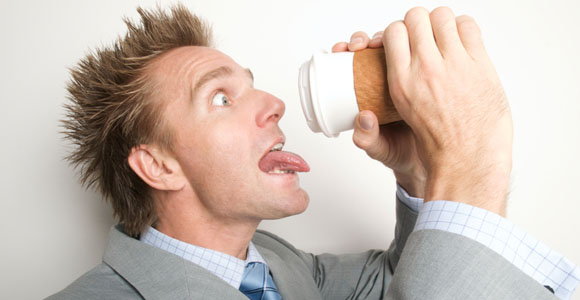Caffeine seems to be popping up on food labels everywhere. Sure, it's in coffee, but it's also in nutrition supplements on quick dissolve strips and energy shots. And it's no wonder why, caffeine has been shown to boost energy levels, alertness and endurance. Trouble is, it's possible to consume too much caffeine and even abuse this stimulant.
The Risk
Caffeine can cause nervousness, jitters and an irregular heartbeat in people sensitive to this stimulant or for those who are consuming it in large amounts. Depending on an individual's size, body mass, age and health conditions, caffeine will have a different effect. Insomnia or trouble sleeping is also related to over-consumption. If you trying to regulate your sleep patterns, avoid consuming caffeine after 3 p.m.
Topping Out
According to the American Dietetic Association, we should not be consuming any more than 200 to 300 milligrams of caffeine per day. That's equivalent to two or three cups of coffee a day. Any more than that could be harmful. But, even if you're consuming upwards of four cups of coffee or 400-plus milligrams of caffeine, you're likely to reach a point of diminishing returns.
Louise Burke, author of Caffeine for Sports Performance, says that the benefits appear to top out at doses higher than three milligrams per kilogram of body weight (about 2.5 cups of coffee for a 150-pound person). After topping out, people begin to experience adverse affects.
Overdoing It
If you're consuming more than 400 milligrams of caffeine and feel nervous, jumpy or have trouble sleeping, chances are good that you're overdoing it. Your best bet is beginning the process of curbing your caffeine habit.
Don't try to cut yourself off cold turkey. A better idea is to monitor your intake of caffeine and back yourself off slowly. Use these tips for taking control of your caffeine consumption.
Take Control
Monitor Intake: Take note of how much caffeine you are consuming. Pay close attention to food labels and check supplements and medications for hidden doses of caffeine. For instance, some pain relievers contain as much as 130 mg of caffeine.
Back it Off: Gradually reduce the amount of caffeine you consume. Don't cut yourself off too drastically. Avoid withdrawal by taking small steps towards lessening your caffeine intake.
Try Decaf: If you can't do without your coffee or tea, opt for the decaf version of these beverages. You could also try herbal teas that do not contain any caffeine.
Exercise Instead: A regular exercise routine has been shown to boost energy levels and productivity. Instead of resorting to a caffeine-laden drink, try going for a walk or jog.
Eat Well: Fueling your body with the proper foods packed with nutrients can help provide sustained energy.
7 Foods that are Infused with Caffeine
Joe Vennare is an accomplished fitness entrepreneur who develops, instructs and writes about innovative fitness programs. He is the co-founder of Hybrid Athlete, Kettlebell Cardio, and Race Day Domination.




